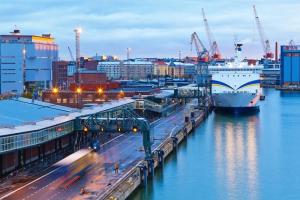To share, exchange and understand data, ships and ports need to use harmonized international standards. When ships enter and leave ports, vital information must be exchanged with various entities on land about the ship, cargoes, dangerous goods, crew, passengers and other relevant information for safety and environmental protection reasons.
According to the International Maritime Organization (IMO), more than 4.6 million port calls were recorded globally in 2022, with Norway recording most port calls. Typically, ships spend at least one full day in port so the way this information is shared is crucial and digitalization is key to reducing errors and wait times in ports and improving the quality of exchanged information.
As of 1 January 2024, under IMO’s Convention on Facilitation of International Maritime Traffic (FAL), governments are required to use a single digital platform, known as the Maritime Single Window, to share and exchange information with ships during their port calls.
A significant milestone in the digitalization of maritime transport, the Maritime Single Window is based on UNECE’s Single Window (UNECE Recommendation No. 33), while its implementation is enabled by other UNECE tools that set information exchange standards and thus play a vital role in facilitating global trade and maritime transport.
Developed more than 20 years ago, UNECE’s Single Window ensures efficient exchange of trade-related information and allows for documents to be submitted only once at a single-entry point to fulfil all import, export and transit-related regulatory requirements.
Another flagship UNECE product that plays an integral role in maritime operations is the United Nations Code for Trade and Transport Locations (UN/LOCODE). This geographic coding scheme uniquely and unambiguously identifies locations worldwide for transport and economic activities.
While UN/LOCODE provides standardized location codes, the Maritime Single Window based on UNECE’s Single Window streamlines customs procedures by enabling electronic submission of documentation for maritime shipments. This integration ensures standardized identification and compliance measures across port facilities, further bolstering security and efficiency in global maritime operations.
According to the European Maritime Safety Agency, in 2022 LOCODEs were used over 24 million times across Europe, mostly in Spain, Greece, Norway and Belgium. This means they were used more than 2 million times per month and more than 65,000 times per day.
Yet another UNECE tool that is widely used in international supply chains, transport, and logistics to ensure uniform data exchange is the United Nations rules for Electronic Data Interchange for Administration, Commerce and Transport (UN/EDIFACT). It is used by 100,000 traders in the retail sector alone.
Within the maritime industry, UN/EDICAFT significantly optimizes communication and efficiencies, with some companies sending over 250 million messages per year using the UN/EDIFACT standard and 113,000 messages from one ship alone when entering a port.
Finally, the United Nations Fisheries Language for Universal Exchange (UN/FLUX) provides a harmonized message standard that allows fishery management organizations to automatically access electronic data from fishing vessels and automate the collection and dissemination of the fishery activity data needed for sustainable fishery management and for detecting and combatting illegal, unreported and unregulated fishing.
Together, these UNECE tools are critical to overcoming the fragmentation of digitalization efforts and fostering sustainable, efficient, and transparent supply chains. They cover all the steps of the supply chain process, bridging all modes of transport and industry actors and facilitating information flow across border and regulatory systems on the national, regional and global level.


